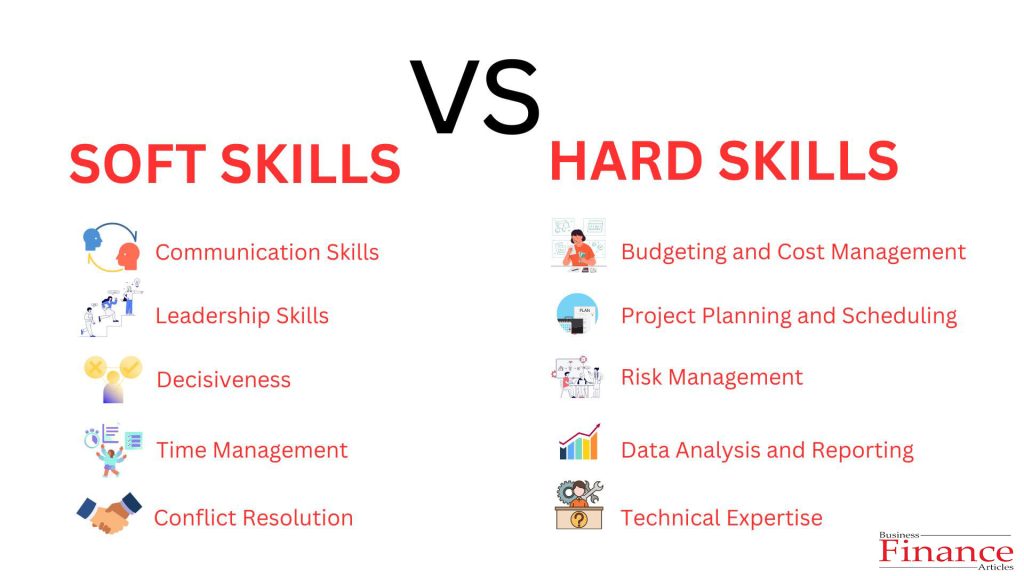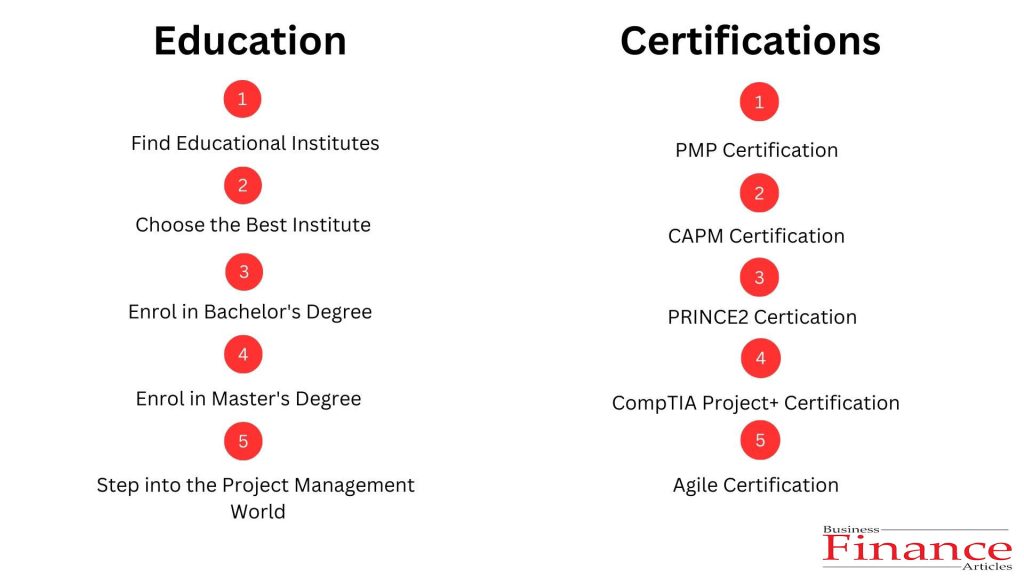Written By: Methew Harbor 
Are you interested in an active career leading teams and driving projects to successful completion? Becoming a project manager could be the perfect path for you. Project managers are in high demand across industries, playing a pivotal role in planning, executing, and delivering projects that meet business objectives.
In this comprehensive guide, we’ll explore what it takes to become a project manager, from the essential skills and qualifications to the education and certifications that can set you apart. We’ll also jump into job search strategies, interview preparation, and career advancement opportunities.
Whether you’re a newcomer or seeking to transition into project management, this article will provide valuable insights to help you navigate your way to a fulfilling career in this exciting field.
Who is a Project Manager?
A project manager is a professional responsible for leading teams in planning, executing, and delivering projects successfully. They define project goals, manage budgets and timelines, allocate resources, mitigate risks, and ensure deliverables meet requirements. Project managers coordinate with team members, stakeholders, and clients throughout the project life cycle. They are skilled at multitasking, problem-solving, communication, and decision-making.
Effective project managers navigate competing priorities, resolve conflicts, and drive projects toward completion within specified constraints. Their role is crucial across various industries for initiatives like marketing campaigns, construction projects, software development, or product launches.
How to Become a Good Project Manager?
Skills and Qualifications
Being a project manager is not an easy task, but you’ve to encompass a variety of skills, including soft and hard skills. These are crucial to shape the complexities that come with managing projects of big units.

Soft Skills for Project Managers
Soft skills are essential for succeeding in project management; however, these skills are not typically taught in a classroom. These include:
- Communication Skills: Clear and effective communication is vital for project managers. They must convey information clearly through various mediums like meetings, emails, and presentations. According to a report, People who use project management tools to improve their communication with clients have outgrown from 11% in 2023 to 19% in 2024.
- Leadership Skills: Project managers must inspire, influence, motivate, and build consensus among their teams, especially during high-stress periods. Strong leadership skills allow them to guide their teams effectively and make tough decisions when needed.
- Decisiveness: While considering input from all team members is important, project managers must also be able to summarize discussions and make clear decisions to keep projects progressing.
- Time Management: Effective time management is crucial for meeting project milestones and deadlines. Project managers must allocate resources effectively, anticipate challenges, build buffer time, and reallocate resources as needed to keep projects on schedule.
- Conflict Resolution: Conflicts are inevitable in projects, arising between team members or stakeholders. Project managers need conflict resolution skills to navigate these situations, defuse tensions, and maintain a harmonious and productive team environment.
Hard Skills for Project Managers
Hard skills are the technical abilities that you can learn through traditional education or hands-on training. Here are some key hard skills that project managers need:
- Budgeting and Cost Management: These skills are critical for project success. Project managers must develop accurate cost estimates, track expenses meticulously, forecast potential budget overruns, and implement strategies to control costs. They need to allocate resources judiciously, negotiate with vendors, and make informed decisions to keep projects within approved budgets.
- Project Planning and Scheduling: Project managers are responsible for creating comprehensive project plans that outline all tasks, milestones, dependencies, and resource requirements. They must develop realistic schedules, allocate resources effectively, and manage dependencies to ensure timely project completion.
- Risk Management: Identifying, analyzing, and mitigating potential risks is a crucial responsibility for project managers. They must assess the probability and impact of risks, develop risk response strategies, and implement plans to minimize disruptions. According to a stats, 27% of organizations always use risk management practices, while 35% use them occasionally.
- Data Analysis and Reporting: One should establish key performance indicators (KPIs) and monitor and analyze data related to project progress, quality, costs, and performance. They must interpret data accurately, identify trends and deviations, and communicate insights effectively through reports and presentations to stakeholders and team members.
- Technical Expertise: Depending on the industry and project domain, project managers may require specific technical knowledge and expertise. For instance, IT project managers should have a solid understanding of software development methodologies, while construction project managers need expertise in engineering principles and building codes.
Education and Certifications
Pursuing formal education and obtaining recognized certifications can significantly boost your knowledge, credibility, and competitiveness in the project management field. While not always mandatory, these qualifications demonstrate your commitment to mastering the principles and methodologies of project management.

Educational Pathways
- Bachelor’s Degree: Many aspiring project managers pursue a bachelor’s degree in project management, business administration, or a related field such as engineering, information technology, or construction management. These programs provide a solid foundation in project management concepts, techniques, tools, and business, and leadership skills.
- Master’s Degree: For those seeking advanced expertise, a master’s degree in project management can be invaluable. These graduate programs help in project management methodologies, risk management, and strategic decision-making. They also offer opportunities for specialization in specific industries or project management frameworks.
Industry-Recognized Certifications
Here are some well-known certificates that can definitely help people grow and become effective project managers. These are:
- PMP Certification: It’s globally recognized, but is widely valued in the United States. This certification proves you’re skilled at leading projects using the PMBOK Guide. You need experience and to pass a tough exam.
- CAPM Certification: It is designed for beginners or those with less experience. It shows you understand basic project management concepts from the PMBOK Guide.
- PRINCE2 Certification: Popular in the UK and Europe, it shows you’re proficient in a structured project management approach.
- CompTIA Project+: This entry-level certification proves you grasp basic project management ideas, ideal for newcomers to the field.
- Agile Certifications: For those working in Agile environments, certifications like CSM or PSM demonstrate your understanding of Agile principles and practices.
All these qualifications can open doors to new opportunities, increase your credibility, and position you for career advancement within the field.
Networking and Professional Development
Networking and staying involved in professional communities is an invaluable step for aspiring project managers. By joining organizations like the Project Management Institute (PMI) and attending industry events or conferences, you can expand your network, learn from experienced professionals, and gain exposure to the latest trends and best practices in project management. This exposure and knowledge sharing can help you develop the necessary skills and stay up-to-date with the field, increasing your chances of success as a project manager.

In a survey done by PMI, communication, problem-solving, collaborative leadership, and strategic thinking are consistently ranked as the most important in helping project professionals fulfill organizational objectives.
Building a Portfolio
Creating a comprehensive portfolio is a powerful way to showcase your project management capabilities to potential employers. A well-crafted portfolio should include documentation from projects you’ve managed, such as project plans, status reports, and presentations. It should also highlight your achievements, skills, and relevant certifications.
Having a strong portfolio not only demonstrates your practical experience but also showcases your attention to detail, communication skills, and ability to deliver successful projects. It can significantly increase your credibility and set you apart as a qualified candidate for project management roles.
Job Search Strategies
An effective job search strategy is crucial for aspiring project managers to land their desired roles. Leverage various resources like online job boards (e.g., LinkedIn, Indeed, ProjectManagementJobs.com), professional networking sites, and job fairs to identify relevant openings. Tailor your resume and cover letter to highlight your project management skills, experiences, and accomplishments that align with the specific job requirements.

Additionally, networking can be a powerful tool in uncovering hidden job opportunities. Reach out to your professional connections, attend industry events, and engage with project management communities to tap into the hidden job market and gain referrals or insider information.
Interview Preparation
Apart from all of the above, getting a good position as a project manager actively demands a prepared interview in the first place. Make sure to research common interview questions specific to project management roles and practice delivering concise yet impactful responses that showcase your relevant experiences, achievements, and problem-solving abilities.
Furthermore, familiarize yourself with the latest project management methodologies, tools, and best practices, as interviewers may assess your knowledge in these areas. Indeed.com in one of its articles says that interviewers usually make an opinion about the person in the first 5-10 minutes, so be prepared and be confident.
Consider practicing mock interviews with a mentor or experienced project manager to receive feedback on your responses, body language, and overall presentation. Additionally, research the company and the role thoroughly to understand their project management approach and tailor your responses accordingly.
Look for Entry-Level Jobs

Practical experience is invaluable for developing the skills needed to be a successful project manager, and one of the best ways to do so is by securing entry-level roles that allow you to learn and apply project management skills. Keep an eye out for job titles such as:
- Project Coordinator
- Operations Coordinator
- Associate Project Manager
- Junior Project Manager
- Operations Associate
- Administrative Associate
These positions typically help in assisting the project management phases, including initiation, planning, execution, monitoring and controlling, and closing. By starting your career in these roles, you can develop a solid foundation in project management principles, processes, and tools while also refining essential soft skills as discussed above.
Career Advancement
While project management offers promising career prospects, those who specialize can unlock greater earning potential. In the US, the median salary for project managers is $116,000 across industries, but professionals pursuing program or portfolio management roles earn more. Declaring an industry specialization also provides a competitive edge during hiring processes and increases chances of landing coveted, industry-specific roles by demonstrating expertise in unique processes and best practices.
Project managers in the US can typically earn between $81,500 to $145,500 annually, with average salaries around $113,500 per year. Project managers can maximize their earning potential and career growth by continuously developing specialized skills, obtaining certifications, and actively pursuing advancement opportunities.
Top Project Manager Jobs in the US
Project managers can opt to go for different further fields. Here is a list of the top types of project managers and their rough approximate as per Indeed, glassdoor, and Built In.

| Project Manager Jobs | Approx. US Salary per Year |
| IT Project Manager | $99,033 |
| Construction Project Manager | $93,457 |
| Engineering Project Manager | $102,574 |
| Software Project Manager | $96495 |
| Healthcare Project Manager | $99835 |
| Business Transformation Project Manager | $136,225 |
| Marketing Project Manager | $81203 |
| Agile Project Manager | $123291 |
| Scrum Master | $114592 |
How to Become a Project Manager Without Experience
While gaining direct project management experience is ideal, it is possible to transition into a project manager role without prior experience. Start with the following steps:
- Assess your skills and interests relevant to project management, evaluating areas where you excel and areas that need improvement.
- Engage in various learning opportunities such as online courses, books, webinars, and mentorship programs to acquire project management knowledge and skills.
- Seek practical experience by actively volunteering for projects, participating in simulated project scenarios or case studies, and joining cross-functional teams within your organization.
- Build a professional network by attending industry events, joining professional groups or associations, and connecting with experienced project managers who can offer advice and potential job opportunities.
- Proactively seek feedback from colleagues, supervisors, or mentors to identify areas where you can further develop and improve your project management capabilities.
- Familiarize yourself with commonly used project management software and tools to enhance your efficiency and effectiveness in managing projects.
- Stay informed about the latest trends, innovations, and best practices in project management by following industry blogs, subscribing to relevant publications, and participating in online forums or communities.
- Focus on improving your verbal and written communication skills, active listening abilities, and conflict resolution techniques essential for effective project management and stakeholder collaboration.
- Demonstrate your leadership potential by taking initiative, leading by example, and volunteering for leadership roles in team projects or extracurricular activities within your organization or community.
End Note
Becoming a successful project manager requires dedication, continuous learning, and a passion for leading teams toward achieving goals. While the path may seem challenging, the rewards of a career in project management are immense. By developing the necessary skills, obtaining relevant qualifications, and actively pursuing opportunities, you can pave your way to a fulfilling and dynamic career.
Remember, effective project management is a critical component of organizational success, and skilled professionals in this field are highly valued across industries.
Successful project managers have many different leadership qualities that they use to help their team. They may adopt a charismatic leadership style to inspire and motivate, an adaptive approach to direct changing circumstances, or a coaching mindset to mentor and develop their team members. Being able to use these different qualities well is what makes outstanding project managers stand out. They can lead their teams effectively and get great results. Keep going, stay dedicated, and you’ll become a successful and influential project manager in no time.

Matthew is a Co-Founder at BusinessFinanceArticles.org. Matthew was a floor manager at a local restaurant in Wales. He lost his job after the pandemic and took initiative to make a team and start the project.
Leave a Reply